Harishyam Arts Blog
Why Lord Shiva is Called the Mahadeva – The Supreme God
By Lakshay Sharma | On 23 October, 2025 | Views
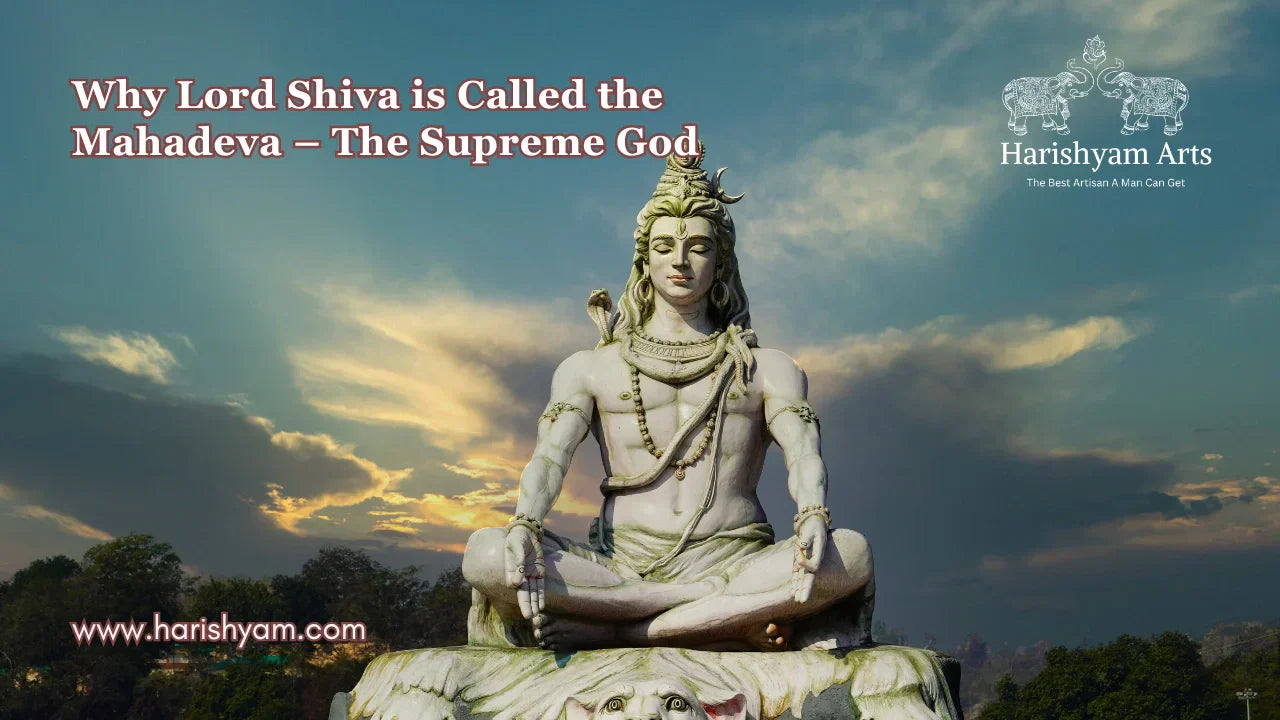
Hinduism, one of the world’s oldest religions, has a rich pantheon of deities, each representing unique aspects of life and the universe. Among them, Lord Shiva holds a special place as Mahadeva, meaning the “Great God” or Supreme God. But why exactly is Shiva called Mahadeva? Let’s explore the spiritual, philosophical, and symbolic reasons behind this revered title.
Who is Shiva?
Lord Shiva is one of the principal deities of Hinduism, revered as the destroyer and transformer within the Trimurti—the trinity that includes Brahma (creator) and Vishnu (preserver).
Shiva represents the ultimate reality, the eternal consciousness, and is often depicted in a meditative pose, symbolizing supreme control over mind and matter. He is worshipped in multiple forms:
-
Shiva Lingam – representing cosmic energy and formless divinity
-
Nataraja – the Lord of Dance, symbolizing cosmic rhythm
-
Meditative Yogi – embodying peace, asceticism, and spiritual mastery
Shiva’s devotees seek spiritual liberation, inner peace, and protection from negative energies through devotion and meditation.
What is the Meaning of Mahadeva?
The term Mahadeva comes from Sanskrit:
-
Maha – “Great” or “Supreme”
-
Deva – “God” or “Divine Being”
Thus, Mahadeva literally means “The Greatest God” or “Supreme God”. While many deities exist in Hinduism, Mahadeva represents the ultimate, all-encompassing divine force that governs creation, preservation, and destruction.
Symbolic Significance of Mahadeva
-
Supremacy and Omnipotence: Mahadeva symbolizes the absolute power over the universe. Unlike other gods, he oversees the entire cosmic cycle.
-
Transformation and Liberation: As the destroyer of ignorance, ego, and illusions, Mahadeva embodies spiritual transformation, guiding devotees toward moksha (liberation).
-
Unity of Opposites: Mahadeva represents balance—fierce yet benevolent, ascetic yet householder, meditative yet dynamic.
-
Transcendence Beyond Form: Mahadeva highlights Shiva’s supreme nature beyond human comprehension, existing in both form (Shiva) and formless consciousness.
-
Cosmic Order: With his trident, third eye, and crescent moon, Mahadeva symbolizes the harmony of creation, preservation, and destruction, the cycles of time, and the spiritual path for humanity.
Between Shiva and Mahadeva
While often used interchangeably, there is a subtle distinction:
-
Shiva: Refers to the approachable deity worshipped in temples and through rituals. He embodies qualities like compassion, asceticism, and devotion.
-
Mahadeva: Emphasizes Shiva’s supreme, cosmic, and ultimate aspect. It denotes his all-encompassing power, beyond human understanding.
In essence, Shiva is the personal god, while Mahadeva reflects the universal, infinite consciousness.
Shiva as the Lord of Destruction and Transformation
Shiva’s role as the destroyer is not negative; it represents transformation and renewal. He destroys ignorance, ego, and illusions, paving the way for spiritual growth. This transcendent power is why he is revered as Mahadeva, the Supreme God.
The Symbolism of Lord Shiva
Shiva is depicted with several symbols that reinforce his supreme status:
-
Trident (Trishul): Represents creation, preservation, and destruction.
-
Third Eye: Symbolizes spiritual knowledge and the ability to destroy evil.
-
Crescent Moon: Signifies control over time and emotions.
-
River Ganga: Denotes purity and sustenance for all life.
-
Meditative Pose: Demonstrates supreme control over mind and body.
Each attribute reflects a cosmic principle, emphasizing why Shiva is revered as Mahadeva.
Shiva in the Trinity (Trimurti)
In Hinduism, the Trimurti consists of:
-
Brahma – the Creator
-
Vishnu – the Preserver
-
Shiva – the Destroyer
While creation and preservation are temporary, destruction allows transformation and new creation. Shiva’s role in this eternal cycle highlights his supreme, transcendent nature as Mahadeva.
Devotional Significance – Why Worship Shiva as Mahadeva
Millions of devotees worship Lord Shiva for:
-
Spiritual liberation (Moksha)
-
Cleansing of sins
-
Inner strength and peace
-
Protection from negative energies
Temples, rituals, and festivals like Maha Shivaratri celebrate his supreme power and cosmic significance.
Philosophical Perspective
According to Shaivism, Shiva is not just a deity but the eternal consciousness, the formless essence from which everything originates and ultimately dissolves. This concept emphasizes why he is called Mahadeva, the absolute, limitless, and eternal principle of the universe.
FAQs – Why Shiva is Called Mahadeva
Q1: What does Mahadeva mean?
Ans:Mahadeva means “Great God” or “Supreme God,” signifying Lord Shiva’s transcendence over all deities.
Q2: Who is Shiva?
Ans: Shiva is a principal Hindu deity, known as the destroyer and transformer, worshipped for spiritual growth and protection.
Q3: What is the difference between Shiva and Mahadeva?
Ans: Shiva is the approachable deity; Mahadeva emphasizes his supreme, cosmic, and absolute nature.
Q4: Why is Shiva called the destroyer?
Ans: Shiva destroys ignorance, ego, and negative energies to allow spiritual renewal and transformation.
Q5: How is Shiva worshipped as Mahadeva?
Ans: Through rituals, prayers, meditation, and festivals like Maha Shivaratri to seek spiritual blessings.
Conclusion
Lord Shiva, the Mahadeva, represents the ultimate truth, cosmic power, and spiritual transformation. Understanding the difference between Shiva and Mahadeva helps devotees appreciate both his approachable and supreme aspects. Worshipping Shiva guides one toward inner strength, wisdom, and liberation.
Bring the divine energy of Mahadeva into your home with marble Shiva idols and statues from Harishyam Arts.
Hinduism, one of the world’s oldest religions, has a rich pantheon of deities, each representing unique aspects of life and the universe. Among them, Lord Shiva holds a special place as Mahadeva, meaning the “Great God” or Supreme God. But why exactly is Shiva called Mahadeva? Let’s explore the...

Lakshay Sharma
I’m Lakshay Sharma, a writer with a deep passion for Hindu mythology, Vastu Shastra, and home interiors. I enjoy exploring the rich traditions of Hindu gods and goddesses, sharing insights into Vastu principles, and offering guidance on creating sacred spaces like Puja Mandirs. Through my writing, I aim to inspire harmony and spiritual well-being, blending traditional knowledge with modern perspectives.
Harishyam Arts | Jaipur
Related Blogs

Guide to Inlay, Meenakari and Gold Leaf Work on Marble Idols
Lakshay Sharma | December 06, 2025
Marble has been cherished for centuries for its timeless beauty, durability, a...
Read More...
Brass Idols vs. Other Materials: Comparing Durability, Look, and Spiritual Aura
Lakshay Sharma | December 05, 2025
In the world of sacred art and worship, the material chosen for an idol or mur...
Read More...
Makar Sankranti 2026: Date, Significance, Puja Method, and Celebration Tips
Lakshay Sharma | December 04, 2025
Makar Sankranti is one of the most awaited festivals in India, celebrated with...
Read More...
Teak Wood, Sheesham and MDF for Mandirs: Pros and Cons Explained
Lakshay Sharma | December 03, 2025
Choosing the right material for your home mandir is an important decision—one ...
Read More...
First-Time Buyer Guide to Ordering Custom Marble Murtis Online from Jaipur
Lakshay Sharma | December 02, 2025
Why Jaipur Is Famous for Marble Murtis
Jaipur ...
Read More...
Why Carved Teak Wood Furniture Is Making a Comeback in Indian Homes
Lakshay Sharma | December 01, 2025
Indian homes have always embraced tradition, craftsmanship, and timeless beaut...
Read More...
How to Choose the Ideal Pooja Mandir for Your Home: Material, Size, and Style
Lakshay Sharma | November 30, 2025
A pooja mandir is the sacred heart of every Indian home, where spirituality me...
Read More...Who is Ghantaghar Mahavir Swami? The Spiritual Legacy Behind the Iconic Name
Lakshay Sharma | November 29, 2025
The term “Ghantaghar Mahavir Swami” refers to the di...
Read More...
Guidelines for gifting god idols to others
Lakshay Sharma | November 28, 2025
Gifting a God idol is considered a highly auspicious act in Indian tradition. ...
Read More...
What happens if God idol breaks by mistake
Lakshay Sharma | November 27, 2025
God idols represent purity, devotion, and divine energy in every Hindu home. W...
Read More...
Mixing Materials: Marble Mandirs with Wooden, Brass, or Metal Accents
Lakshay Sharma | November 26, 2025
Combining marble with wooden, brass, or metal accents transforms a simple mand...
Read More...
Step-by-Step Guide to Professional Marble Statue Repainting
Lakshay Sharma | November 24, 2025
Marble statues are timeless masterpieces that reflect devotion, beauty, and cr...
Read More...
Is It Okay to Hang a Mandir on a Wall? A Complete Guide to Wall-Mounted Temples
Lakshay Sharma | November 23, 2025
In today’s fast-paced world, where urban homes are becoming more compact and s...
Read More...
Who is Parashvanath? The Life and Legacy of Jainism’s 23rd Tirthankara
Lakshay Sharma | November 22, 2025
Faith and spirituality are cornerstones of Indian tradition, and Jainism stand...
Read More...
How to Choose Between Carved and Minimalistic Wooden Mandirs
Lakshay Sharma | November 21, 2025
A home mandir (temple) is far more than just a piece of furniture; it is the s...
Read More...
How to clean silver god idols at home
Lakshay Sharma | November 21, 2025
At Harishyam Arts, we understand the spiritual and aesthetic significance of s...
Read More...
Are Marble Dust Statues Ideal for Your Home Temple? Pros & Cons
Lakshay Sharma | November 19, 2025
When it comes to selecting statues for your home temple, marble dust statues h...
Read More...
Where to Buy Authentic Marble Gods' Moortis in the USA: A Guide for Devotees and Collectors
Lakshay Sharma | November 19, 2025
For devotees and collectors in the USA seeking authentic marble Hindu god moor...
Read More...
Maa Parvati 108 Names in Sanskrit and English: Their Significance, Meaning, and Mantra Power
Lakshay Sharma | November 17, 2025
The Divine Essence of Maa Parvati
Maa Parvati,...
Read More...
8 Guidelines for Setting Up Your Home Mandir with Wooden Murtis: Location, Selection, and Maintenance.
Lakshay Sharma | November 16, 2025
Introduction: The Divine Mother of Strength and Compassion

Who Was Jain Mahavir? The Life, Teachings, and Legacy of the 24th Tirthankara
Lakshay Sharma | November 15, 2025
Lord Mahavir, the 24th Tirthankara of Jainism, was a spiritual reformer who re...
Read More...
Benefits of Choosing Corian Mandirs Over Marble and Wood
Lakshay Sharma | November 14, 2025
Modern homes today demand elegance, functionality, and easy upkeep — and Coria...
Read More...
White vs. Black Shivling: Which One Is Best for Your Home and Why?
Lakshay Sharma | November 13, 2025
The Shivling, a sacred symbol of Lord Shiva, embodies creation, power, and pur...
Read More...
10 Stunning Marble Handicraft Pieces to Elevate Your Home Décor
Lakshay Sharma | November 12, 2025
Marble handicrafts represent timeless artistry, luxury, and devotion. At Haris...
Read More...
Brass Ganesha Idols as Gifts: Symbolism, Occasions, and Gifting Etiquette
Lakshay Sharma | November 11, 2025
Gifting a brass Ganesha idol is more than a gesture—it's a blessing of prosper...
Read More...
Luxury Kids Room Decor Ideas That Turn Every Space Into a Fairytale Dream
Lakshay Sharma | November 10, 2025
Transforming a child’s room into a luxury fairytale dream combines comfort wit...
Read More...
Why Repainting Your Marble Statue Can Extend Its Life and Beauty
Lakshay Sharma | November 09, 2025
Marble statues are elegant pieces of art that add charm to any home or temple....
Read More...
How to Choose the Perfect Wall-Mounted Wooden Mandir for Your Home
Lakshay Sharma | November 08, 2025
A wall-mounted wooden mandir is more than just a spiritual corner; it’s a blen...
Read More...
Understanding GST on Marble God Statues: A Complete Guide for Buyers and Sellers
Lakshay Sharma | November 07, 2025
Marble god statues are a popular choice for temples, homes, and offices due to...
Read More...
Are Wooden Statues Pest-Resistant? How to Protect Your Wooden Idols from Insects and Damage
Lakshay Sharma | November 06, 2025
Wooden statues have been cherished for centuries due to their natural beauty a...
Read More...
Corian vs Wooden Temples: Which One Should You Choose?
Lakshay Sharma | November 05, 2025
Choosing the perfect temple for your home is more than just selecting a design...
Read More...
How Customised Marble Human Bust Manufacturers Bring Personalities to Life
Lakshay Sharma | November 04, 2025
Crafting a marble human bust is so much more than sculpting a likeness—it's ab...
Read More...
The Power of the Hare Krishna Maha Mantra: Awakening Spiritual Bliss
Lakshay Sharma | November 03, 2025
The Hare Krishna Maha Mantra is a sacred chant that ...
Read More...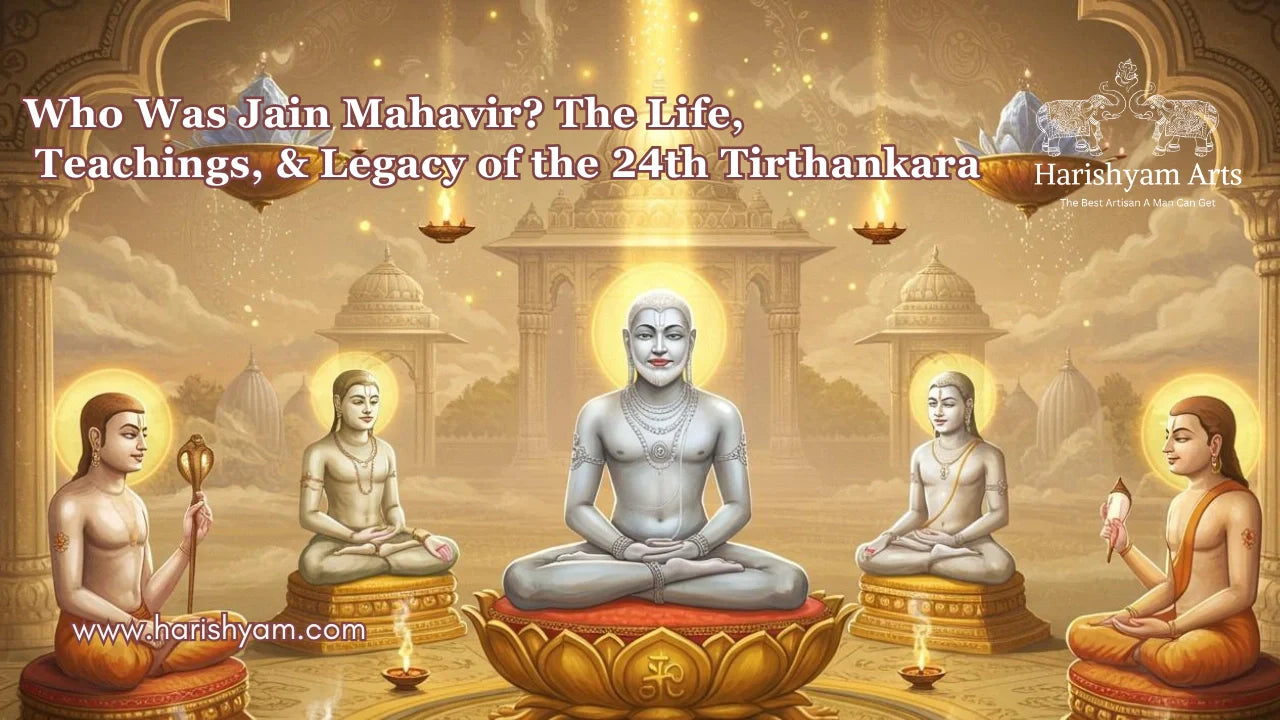
The 24 Tirthankaras of Jainism: Names, Symbols, and Significance
Lakshay Sharma | November 02, 2025
In Jainism, the Tirthankaras are revered as divine s...
Read More...
Top 25 Space-Saving Wooden Mandir Ideas for Modern Homes
Lakshay Sharma | November 01, 2025
A pooja mandir is the heart of every Indian home — a sacred corner where peace...
Read More...
What Are the 8 Forms of Lakshmi? | Ashta Lakshmi Meaning and Significance
Lakshay Sharma | October 31, 2025
The Divine Essence of Goddess Lakshmi
Goddess La...
Read More...
The Art of Craftsmanship: How Handmade Brass Statues Are Created
Lakshay Sharma | October 30, 2025
At Harishyam Arts, we celebrate the timeless beauty ...
Read More...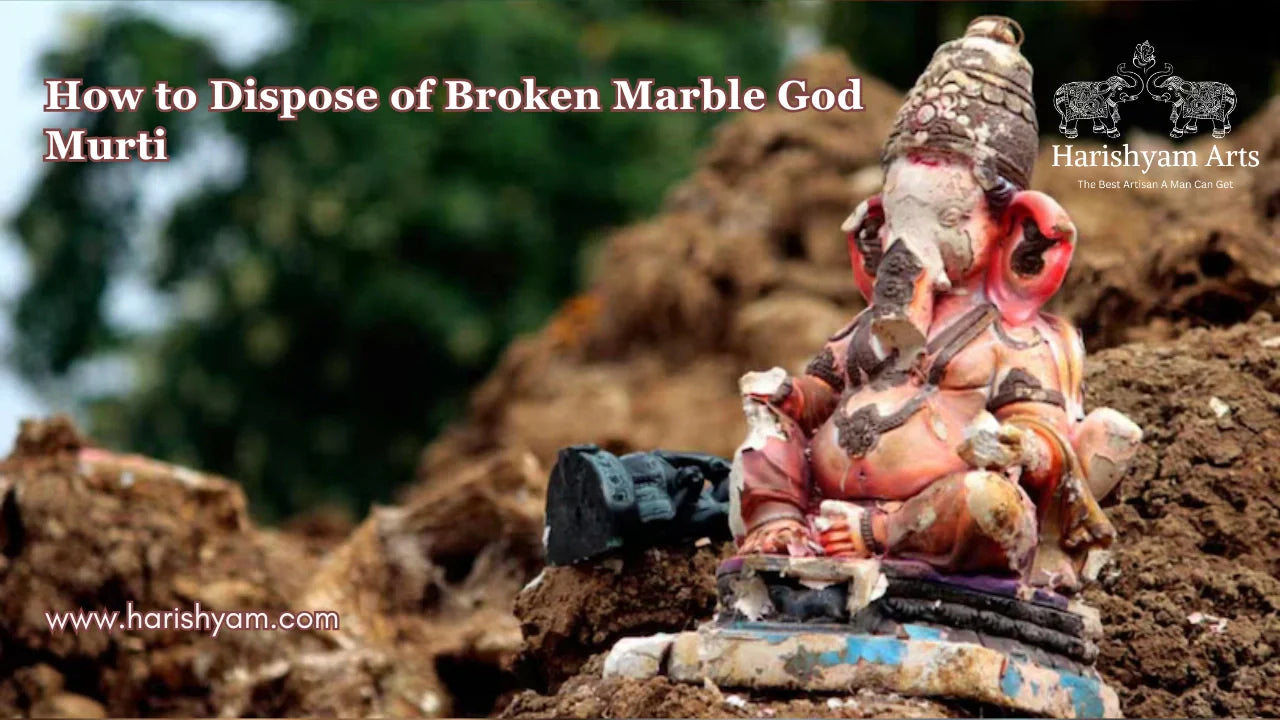
How to Dispose of Broken Marble God Murti
Lakshay Sharma | October 30, 2025
In Hindu tradition, marble murtis represent divine presence and spiritual ener...
Read More...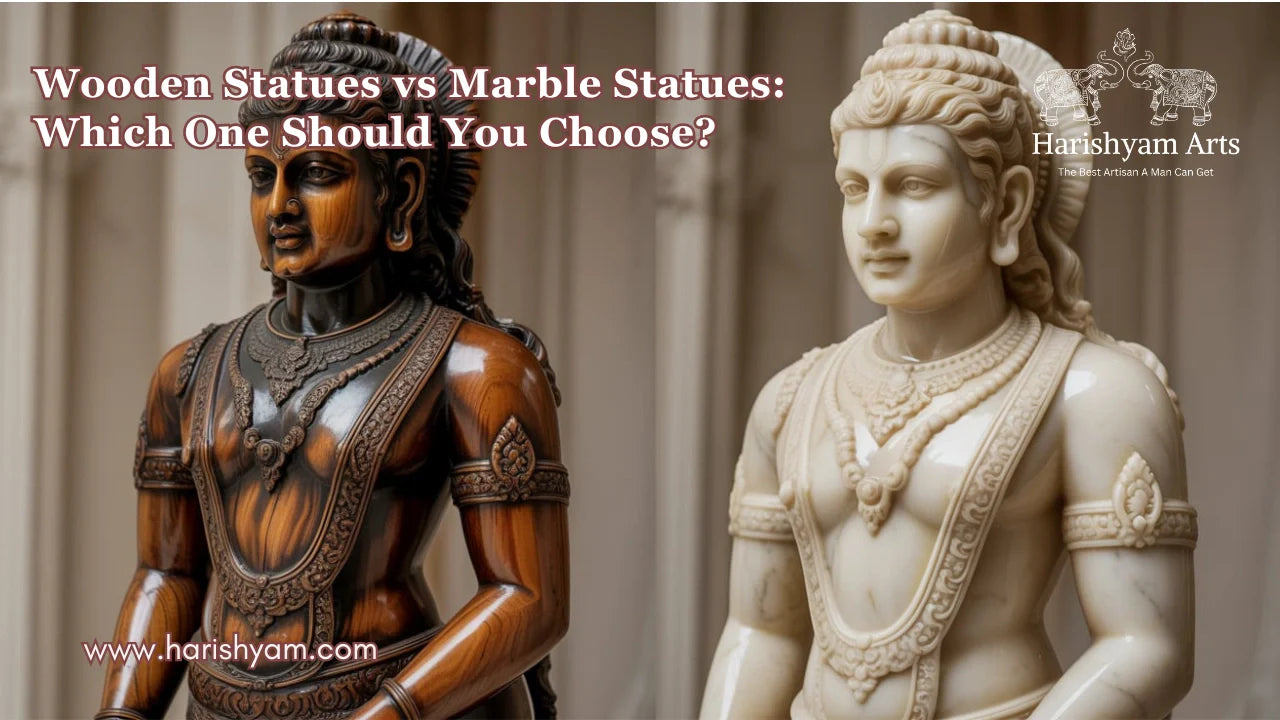
Wooden Statues vs Marble Statues: Which One Should You Choose?
Lakshay Sharma | October 29, 2025
When it comes to decorating your home or creating a sacred space, choosing the...
Read More...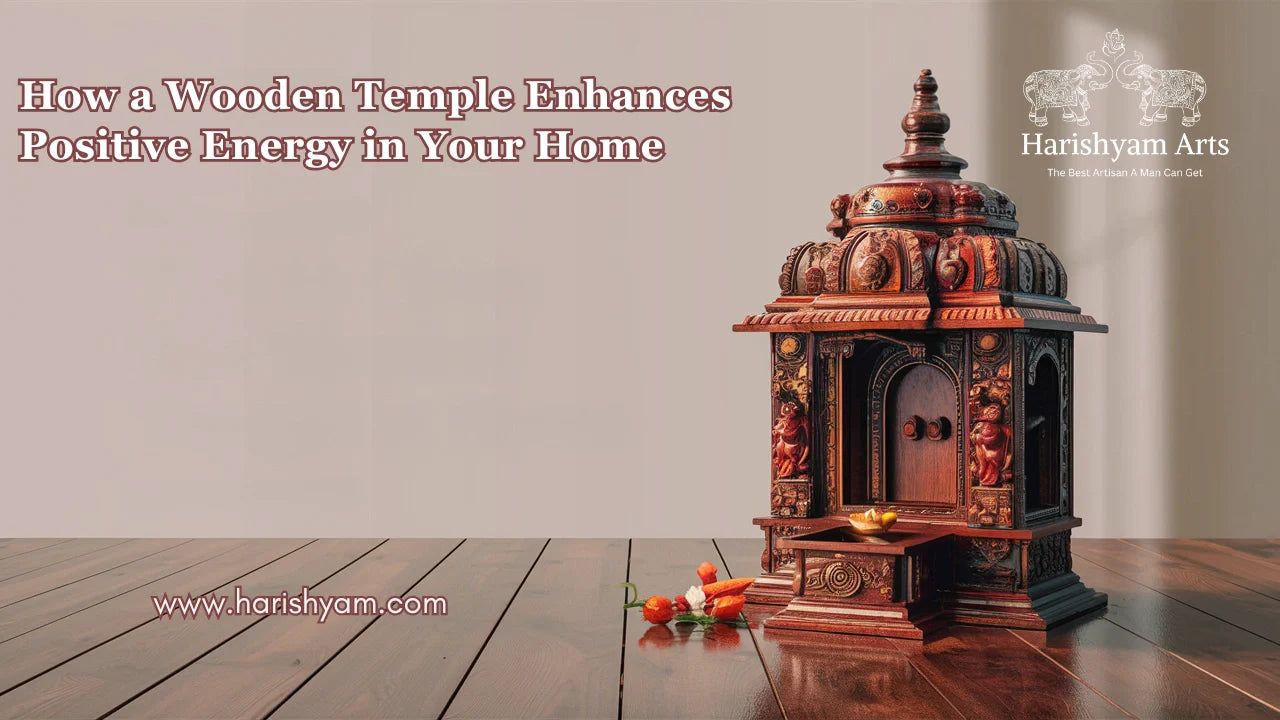
How a Wooden Temple Enhances Positive Energy in Your Home
Lakshay Sharma | October 28, 2025
A home temple isn’t just a decorative corner — it’s the spiritual...
Read More...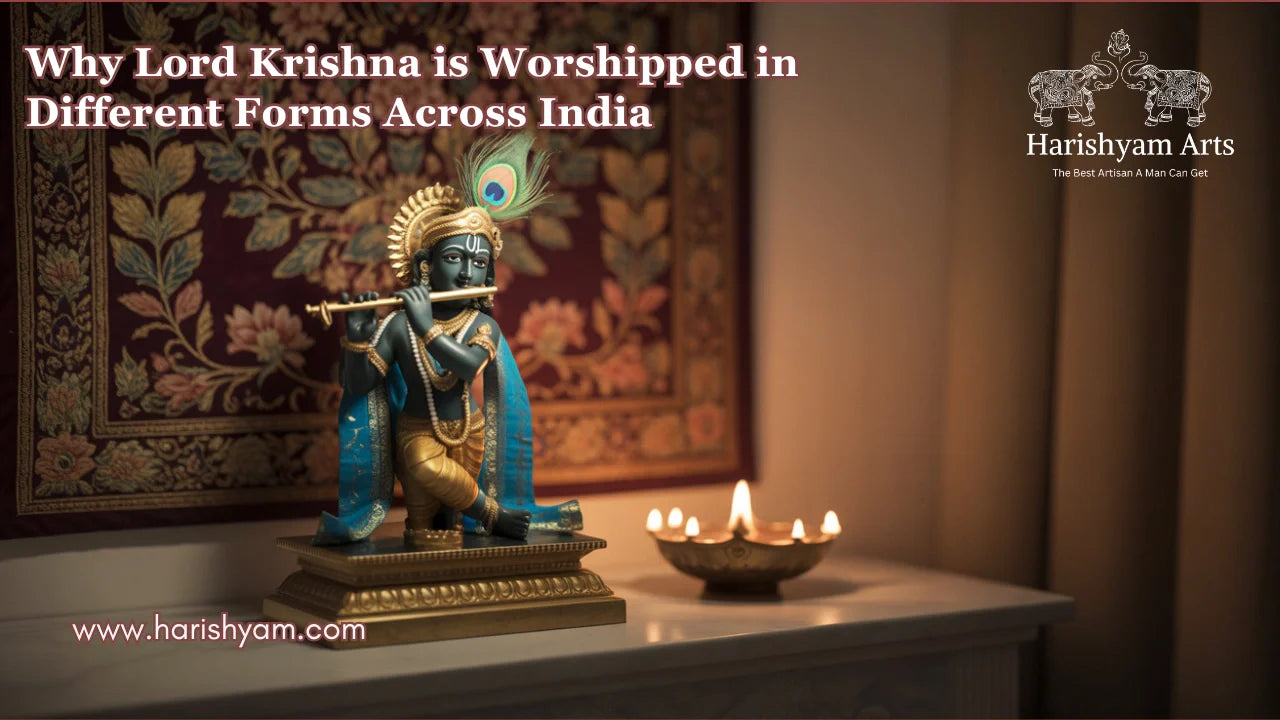
Why Lord Krishna is Worshipped in Different Forms Across India
Lakshay Sharma | October 27, 2025
Lord Krishna — the eighth incarnation of Lord Vishnu — is one of the most belo...
Read More...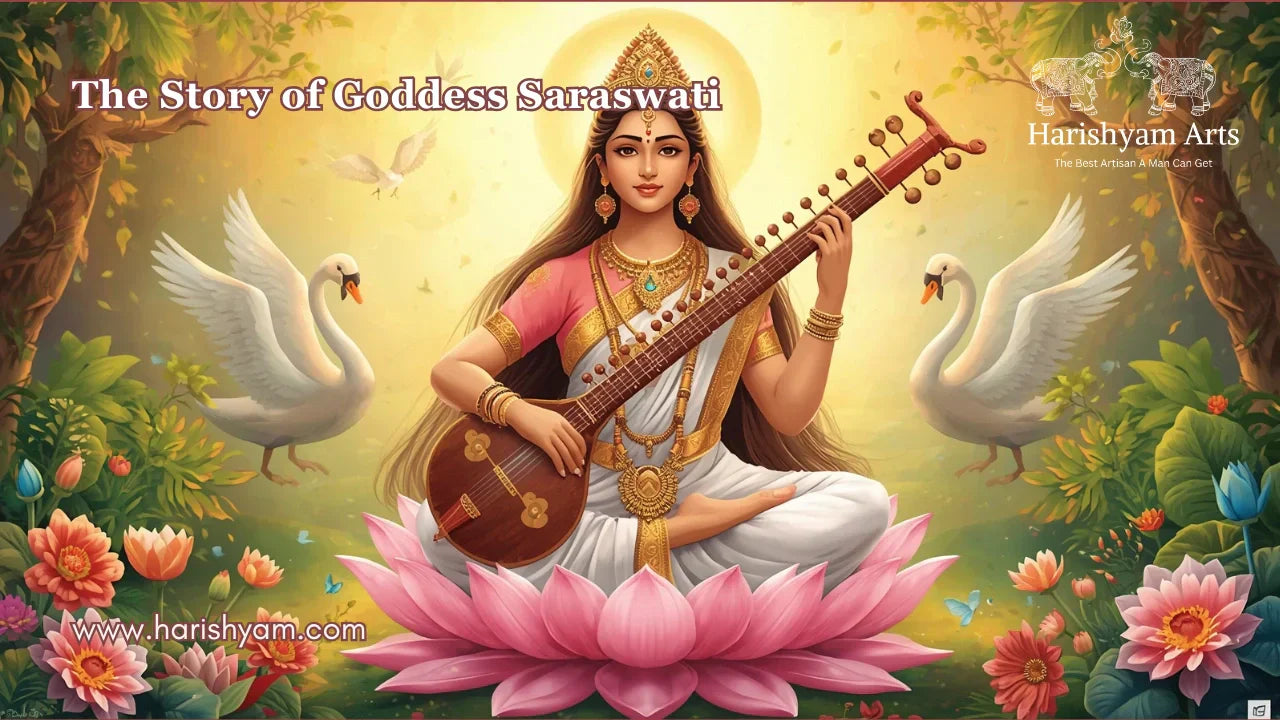
The Story of Goddess Saraswati: The Embodiment of Wisdom and Knowledge
Lakshay Sharma | October 26, 2025
Among the many deities of the Hindu pantheon, Maa Saraswati Read More...
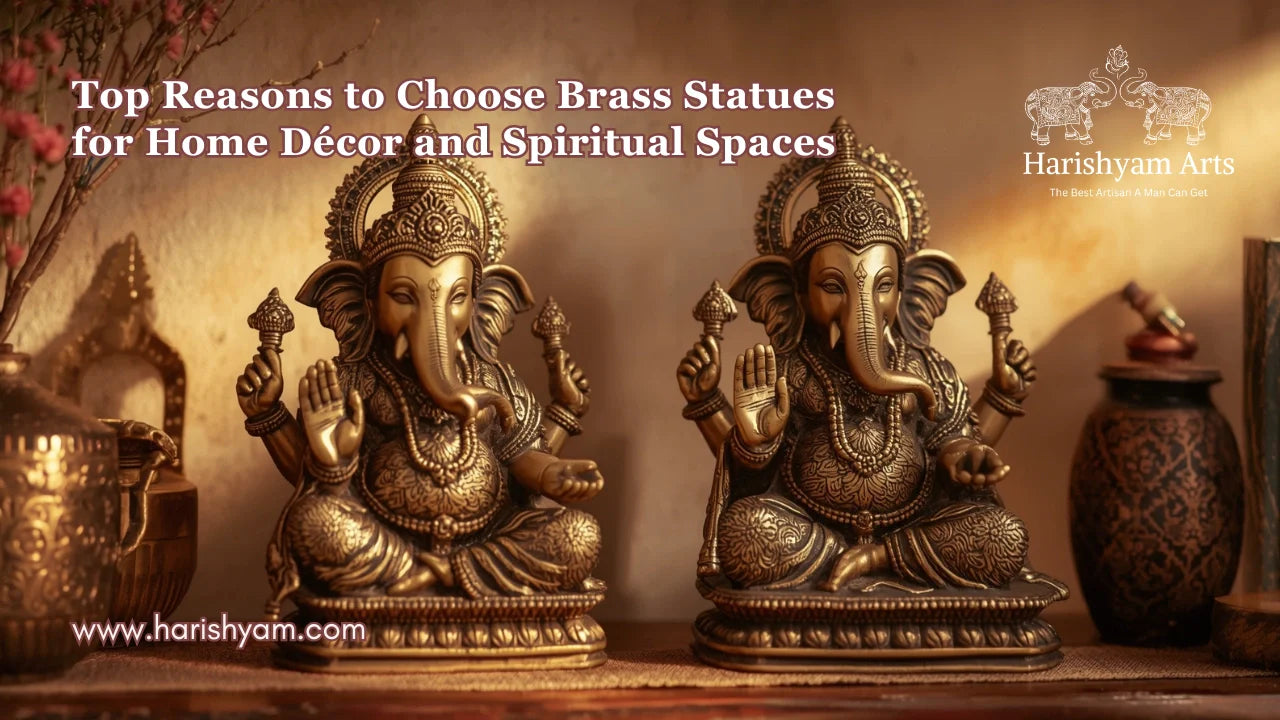
Top Reasons to Choose Brass Statues for Home Décor and Spiritual Spaces
Lakshay Sharma | October 25, 2025
Home décor today is not only about beauty—it’s about creating a peaceful and m...
Read More...
How long do Corian temples last?
Lakshay Sharma | October 24, 2025
Choosing the right material for a temple at home is important for both aesthet...
Read More...
Why Lord Shiva is Called the Mahadeva – The Supreme God
Lakshay Sharma | October 23, 2025
Hinduism, one of the world’s oldest religions, has a rich pantheon of deities,...
Read More...
Why Corian Temples Are Becoming Popular in Contemporary Homes
Lakshay Sharma | October 22, 2025
In today’s modern homes, interior décor blends tradition with contemporary sty...
Read More...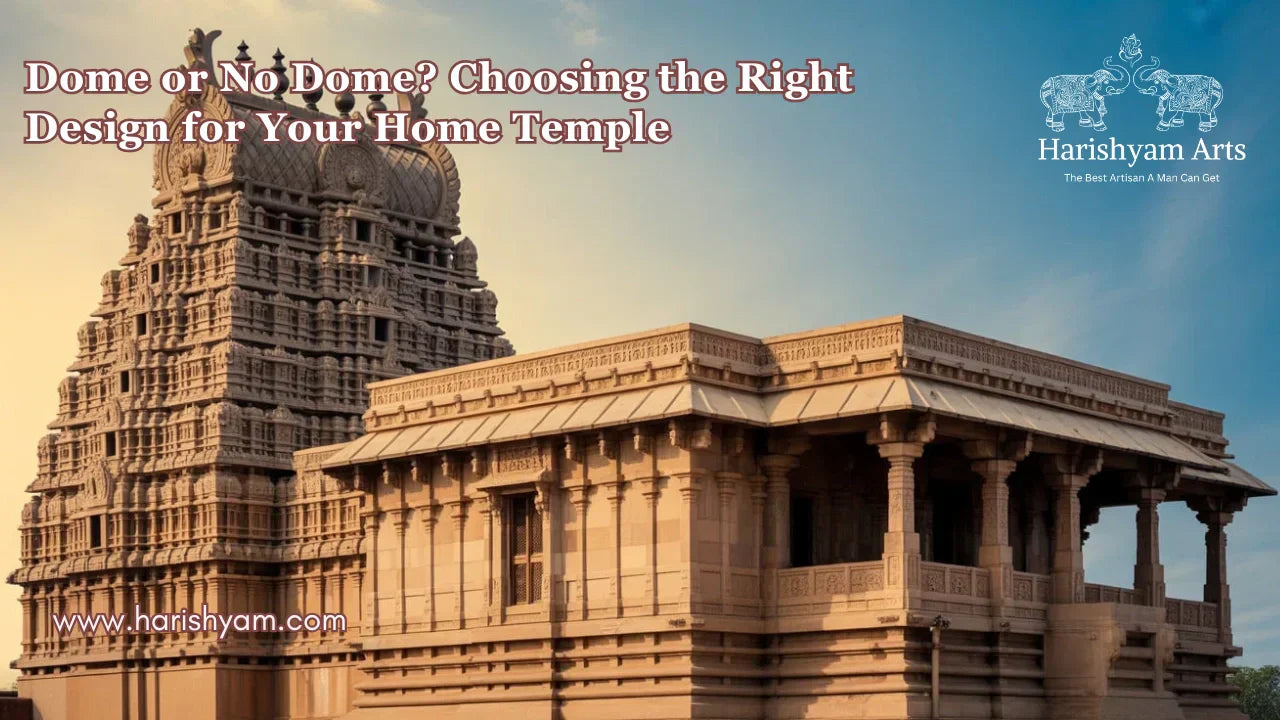
Dome or No Dome? Choosing the Right Design for Your Home Temple
Lakshay Sharma | October 21, 2025
Creating a sacred space at home is a spiritual investment, and the design of y...
Read More...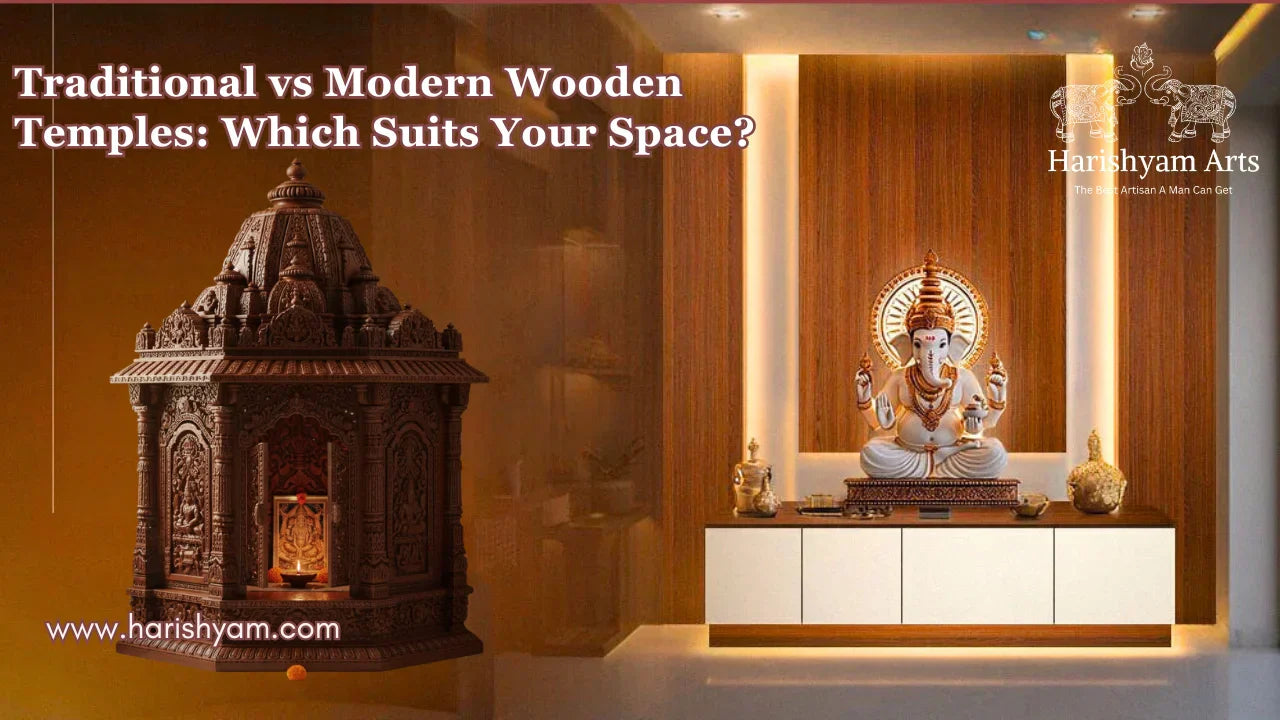
Traditional vs Modern Wooden Temples: Which Suits Your Space?
Lakshay Sharma | October 20, 2025
Creating a sacred space in your home is more than just interior décor — it’s a...
Read More...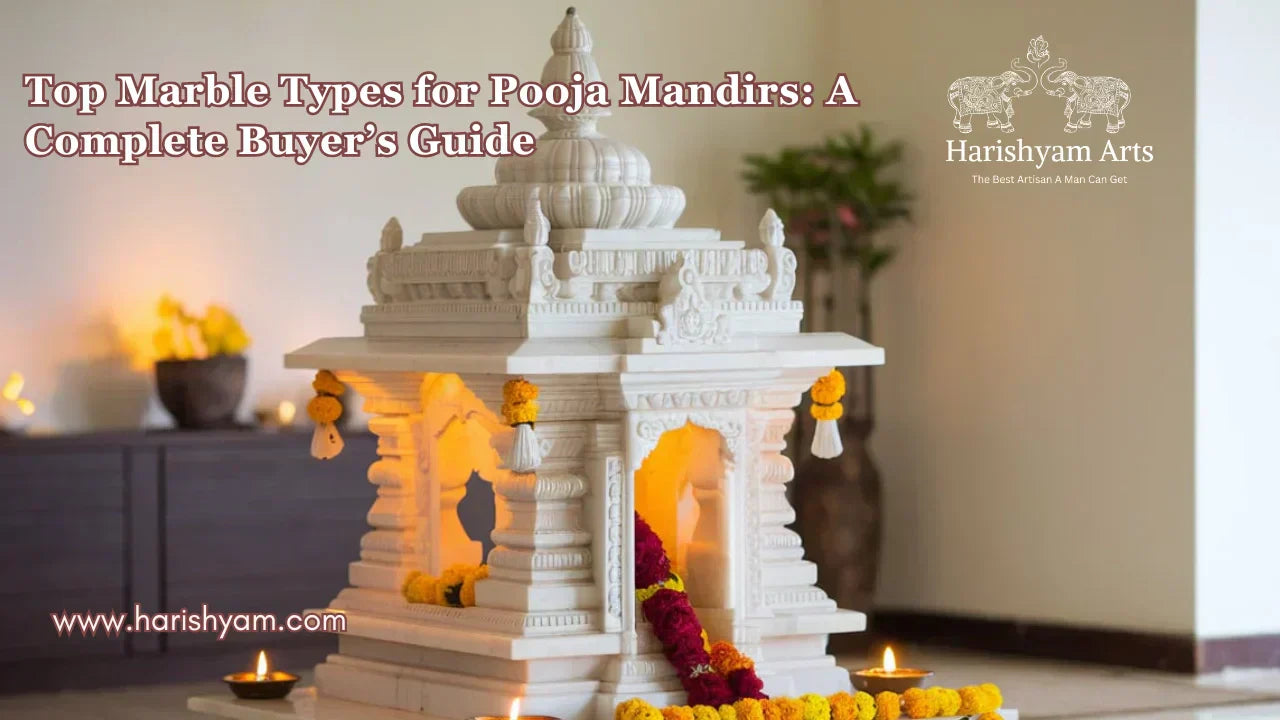
Top Marble Types for Pooja Mandirs: A Complete Buyer’s Guide
Lakshay Sharma | October 19, 2025
A Pooja Mandir is more than just furniture; it is th...
Read More...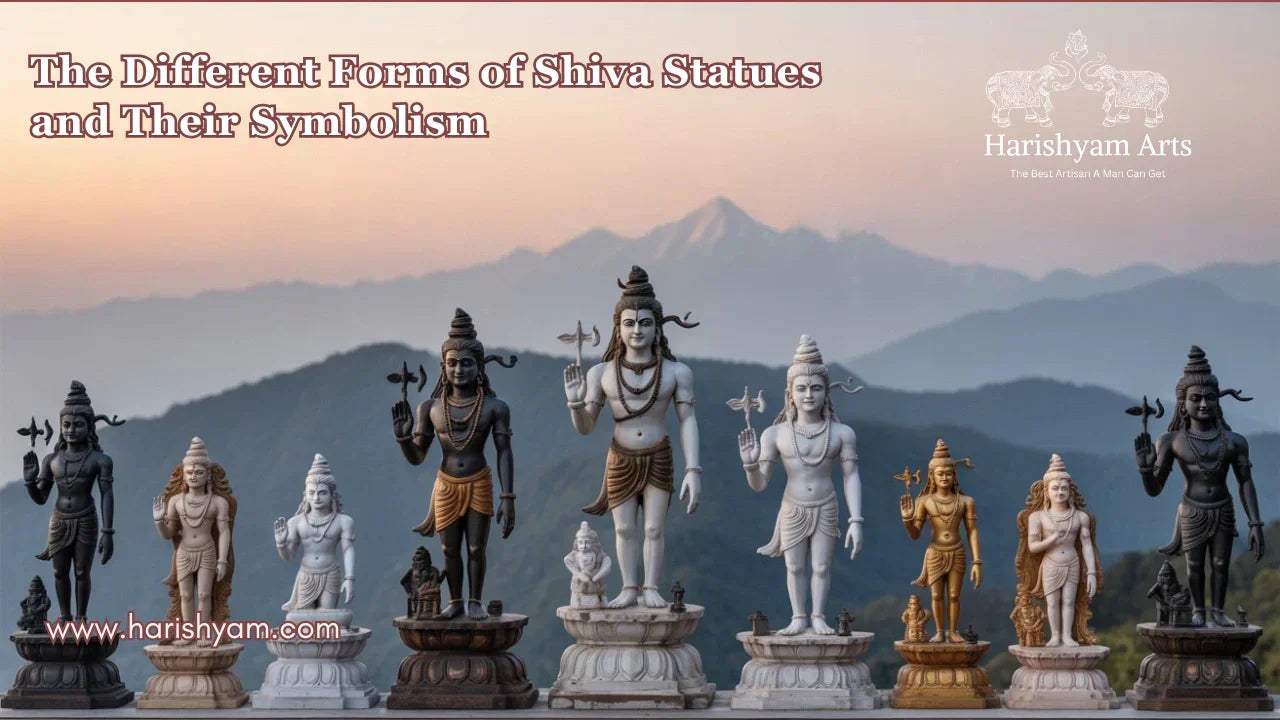
The Different Forms of Shiva Statues and their Symbolism
Lakshay Sharma | October 18, 2025
Introduction to the God Shiva Statue
Lord Shiv...
Read More...



